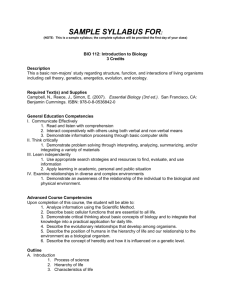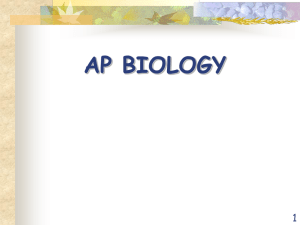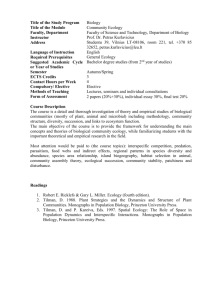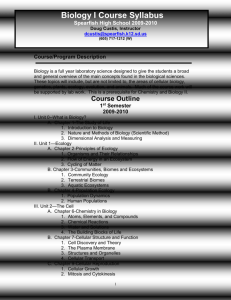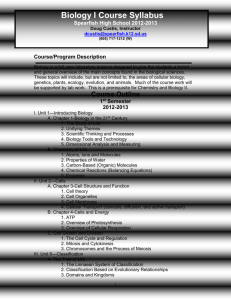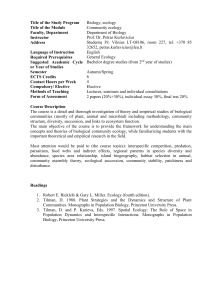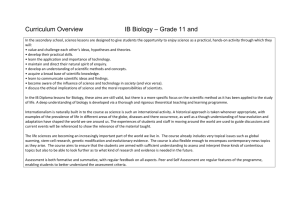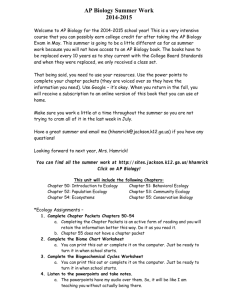IB Diploma Program Course Outline
advertisement
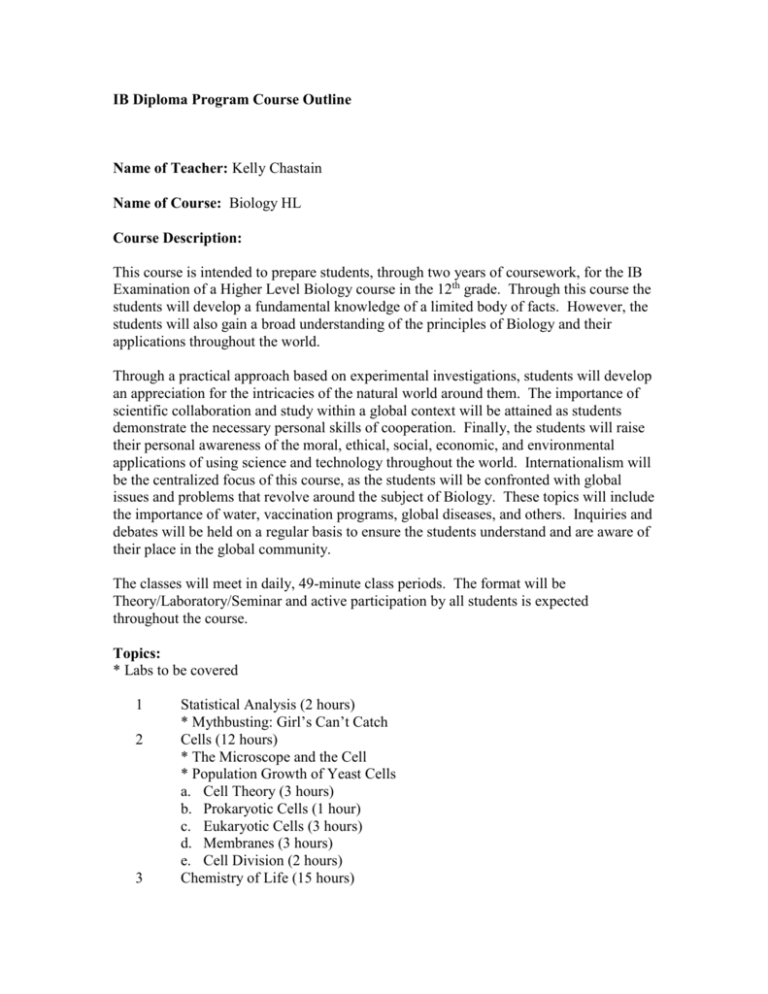
IB Diploma Program Course Outline Name of Teacher: Kelly Chastain Name of Course: Biology HL Course Description: This course is intended to prepare students, through two years of coursework, for the IB Examination of a Higher Level Biology course in the 12th grade. Through this course the students will develop a fundamental knowledge of a limited body of facts. However, the students will also gain a broad understanding of the principles of Biology and their applications throughout the world. Through a practical approach based on experimental investigations, students will develop an appreciation for the intricacies of the natural world around them. The importance of scientific collaboration and study within a global context will be attained as students demonstrate the necessary personal skills of cooperation. Finally, the students will raise their personal awareness of the moral, ethical, social, economic, and environmental applications of using science and technology throughout the world. Internationalism will be the centralized focus of this course, as the students will be confronted with global issues and problems that revolve around the subject of Biology. These topics will include the importance of water, vaccination programs, global diseases, and others. Inquiries and debates will be held on a regular basis to ensure the students understand and are aware of their place in the global community. The classes will meet in daily, 49-minute class periods. The format will be Theory/Laboratory/Seminar and active participation by all students is expected throughout the course. Topics: * Labs to be covered 1 2 3 Statistical Analysis (2 hours) * Mythbusting: Girl’s Can’t Catch Cells (12 hours) * The Microscope and the Cell * Population Growth of Yeast Cells a. Cell Theory (3 hours) b. Prokaryotic Cells (1 hour) c. Eukaryotic Cells (3 hours) d. Membranes (3 hours) e. Cell Division (2 hours) Chemistry of Life (15 hours) 4 5 6 7 8 * Biologically Important Molecules * Enzyme Catalysts (AP 2) * Diffusion and Osmosis (AP 1) a. Chemical Elements of Water (2 hours) b. Carbohydrates, Lipids, and Proteins (2 hours) c. DNA Structure (1 hour) d. DNA Replication (1 hour) e. Transcription and Translation (2 hours) f. Enzymes (2 hours) g. Cell Respiration (2 hours) h. Photosynthesis (3 hours) Genetics (15 hours) * Population Genetics and Evolution (AP 8) * Genetics of Drosophila (AP 7) a. Chromosomes, Genes, Alleles and Mutations (2 hours) b. Meiosis (3 hours) c. Theoretical Genetics (5 hours) d. Genetic Engineering (5 hours) Ecology and Evolution (16 hours) a. Communities and Ecosystems (5 hours) b. The Greenhouse Effect (3 hours) c. Populations (2 hours) d. Evolution (3 hours) e. Classification (3 hours) Human Health and Physiology (20 hours) * Physiology of the Circulatory System (AP 10) * Heart Dissection (Worksheet) * Sheep Brain Dissection (Worksheet) * Sheep Eye Dissection (Worksheet) * Rat Dissection (Worksheet) a. Digestion (3 hours) b. The Transport System (3 hours) c. Defense Against Infectious Disease (3 hours) d. Gas Exchange (2 hours) e. Nerves, Hormones, and Homeostasis (6 hours) f. Reproduction (3 hours) Nucleic Acids and Proteins (11 hours) a. DNA Structure (2 hours) b. DNA Replication (2 hours) c. Transcription (2hours) d. Translation (2 hours) e. Proteins (1hour) f. Enzymes (2 hours) Cell Respiration and Photosynthesis (10 hours) * Cell Respiration (AP 5) * Plant Pigments and Photosynthesis (AP 4) a. Cell Respiration (5 hours) b. Photosynthesis (5 hours) 9 Plant Science (11 hours) * Investigation of Conditions Which Enhance the Rate of Transpiration a. Plant Structure and Growth (4 hours) b. Transport in Angiospermophytes (4 hours) c. Reproduction in Angiospermophytes (3 hours) 10 Genetics (6 hours) * Mitosis and Meiosis (AP 3) a. Meiosis (2 hours) b. Dihybrid Crosses and Gene Linkage (3 hours) c. Polygenic Inheritance (1 hour) 11 Human Health and Physiology (17 hours) * The Menstrual Cycle a. Defense Against Infectious Disease (4 hours) b. Muscles and Movement (4 hours) c. The Kidney (4 hours) d. Reproduction (5 hours) Options (HL) D Evolution (22 hours) a. Origin of Life on Earth (4 hours) b. Species and Speciation (5 hours) c. Human Evolution (6 hours) d. The Hardy-Weinberg Principle (2 hours) e. Phalogeny and Systematics (5 hours) G Ecology and Conservation (22 hours) * Microbial Ecology I * Microbial Ecology II * Using Aquatic Ecology to Study Succession a. Community Ecology (5 hours) b. Ecosystems and Biomes (4 hours) c. Impacts of Humans on Ecosystems (6 hours) d. Conservation of Biodiversity (3 hours) e. Population Ecology (4 hours) * TOTAL 179 teaching hours Assessment: Quizzes and tests will be the common mode of classroom assessment. However, laboratory reports, homework, class participation, and research grades will also be used. In addition, a cumulative mid-term examination will be given during the first December, followed by a final examination in May. Students will be required to demonstrate their skill in planning laboratory activities, collecting data, analyzing data, drawing conclusions, making evaluations, and demonstrating manipulative and personal skills. All students will keep a classroom laboratory journal to be turned in upon request. The same format will be used on the laboratory portfolio that will become part of the Internal Assessment for the IB Examination given at the end of the senior year. This Internal Assessment will consist of inquiry labs and individual experimentation that is graded through a common set of assessment criteria. This criteria to be used formatively and summatively includes Planning (a) and (b), Data Collection, Data Processing and Presentation (Data Analysis), and Conclusion and Evaluation. Manipulative and Personal Skills (a) and (b) will be expressed only summatively. In addition, the Group 4 project will be a collaborative experience with an emphasis placed on the process involved in the investigation. Furthermore, this investigation will allow the students to delve into the ethical, environmental, and social implications as part of a scientific experience. An emphasis will be placed on the students cooperation throughout the scientific process as they may be forced to work through the natural limitations of science. IB External Assessment will consist of three written papers, or exams. Internal Assessment will be moderated by the teacher and externally moderated by the IBO. Paper 1 will consist of multiple-choice questions designed to test the knowledge of the core of the subject. Paper 2 will be divided into two sections, data-based questions and an extended response question. Paper 3 for HL will require the student to answer several short-answer questions and an extended-response question in each of the two options studied. Resources: Text Book: Campbell, N.A., Reece, J.B. 2002. Biology. 6th edition. Benjamin Cummings, California. Lab Manuals: Vodopich, D.S., Moore, R. 2002. Biology Laboratory Manual. 6th edition. McGraw-Hill, Minneapolis. Advanced Placement Biology Lab Manual. 2001. College Board, New York. Supplemental Texts: Biozone Modular Workbooks. (titles below). 2002. Biozone International, New Zealand. Micobiology and Biotechnology Health and Disease Cell Biology and Biochemistry Genes and Inheritance Ecology Human Evolution Evolution Environmental Science Goldberg, D.T. 2004. How to Prepare for the Advanced Placement Exam: Biology. Barrons Educational Services, Inc., New York. Teaching Time: Biology HL – 294 available teaching hours
